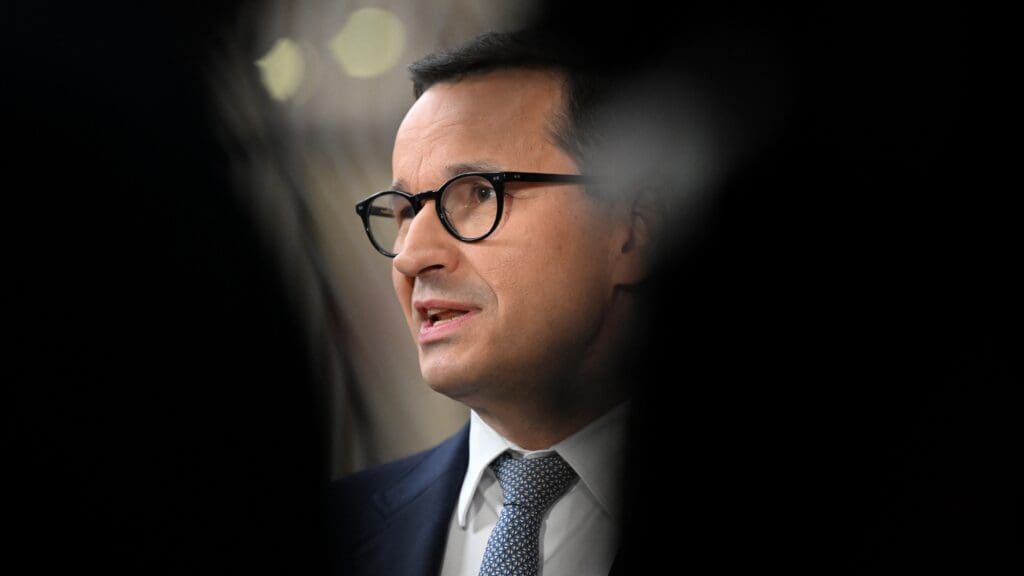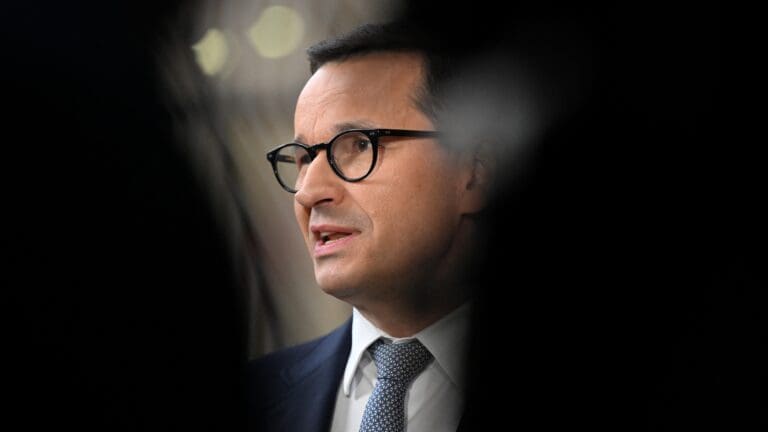This article was published in Vol. 4 No. 1 of our print edition.
Comparing the political landscape and public debates in Germany and Hungary, we cannot fail to notice that many current discourses, differences of opinion, and conflicts—both in bilateral terms and in the wider European context—can be traced back to the different starting points and conditions of policymaking on the political right. The liberal–conservative reform efforts in Hungary can only be fully understood if we take into account the corresponding efforts of the German right.
The CDU’s Situation
In recent weeks and months, much has been written in the press about the weakening of the so-called ‘traffic light coalition’ (a coalition government of the German Social Democratic Party [SPD], the Free Democratic Party [FDP], and Alliance 90/The Greens), the strengthening of Alternative für Deutschland (AfD) and, above all, the changing situation of the Christian Democrats. The CDU still seems to be searching for its role in opposition. The party has yet to process its loss of power and draw the appropriate conclusions from its time in opposition. The self-image of the CDU as a ‘state-forming’ party naturally makes this process more difficult, since it is especially important to support the policies of the current government in geopolitically turbulent times. This can be seen, for example, in issues related to Germany’s Ukraine policy. However, the CDU’s ability to play an oppositional role is also hampered by structural, substantive, and personnel problems.
Structurally, the party is in many respects in the same boat as the federal government, as it heads regional governments in half of Germany’s Bundesländer, or federal states, exclusively in coalition with the traffic light parties, but in different constellations depending on the region in question. The CDU holds the position of minister-president in six provinces and is a junior partner in two others. In Thuringia, the CDU is also propping up the left-wing post-communist minister-president, who is currently governing without a majority.
The only Christian Democratic minister-president with a civic majority in a regional parliament is Markus Söder, the leader of the CDU’s Bavarian sister party the Christian Social Union (CSU). From this position, he can and does attack the federal government forcefully and with credibility. The CDU is much more cautious in this regard, which says a lot about power relations within the CDU/CSU. It should likewise be noted that even in the regional parliament of Schleswig-Holstein, the only region outside Bavaria where the CDU/CSU could govern with a majority—even without AfD—they do not take advantage of this, but instead choose to govern in coalition with the Greens.
In terms of policymaking, many of the central conservative political themes are only weakly and disjointedly espoused by the CDU. And even where they are espoused, a degree of reluctance is always perceptible. Over the years, the Merkel governments primarily governed in coalition with the Social Democrats, thus satisfying many of the Social Democrats’ policy and career goals. Despite this, the CDU/CSU shifted even more to the left, especially on issues important to the Green Party, in response to actual or perceived societal expectations. This was particularly evident in the policy domains of migration, social issues, energy, and defence.1 The leadership of the CDU is largely made up of Merkel supporters and/or politicians from the Merkel era. This makes it especially difficult to get out of the current structural and policy trap, clearly name the mistakes of the past, draw the appropriate conclusions from them, and make decisive efforts to change policies. Instead of changing both the party’s policy profile and personnel, the CDU/CSU is losing itself in infighting between those who espouse the political philosophy of Angela Merkel and those behind Friedrich Merz.

A Right-Wing Majority?
There is a right-wing majority in half of state parliaments, and in the Bundestag. However, outside of Bavaria, the right has not taken advantage of this. A particularly striking example of this is the already mentioned case of Schleswig-Holstein. In theory, the CDU could govern without its left-wing coalition partner in four provinces, and could enter government in two more. However, this has not happened. Although AfD has elected representatives in all but two state parliaments, it is systematically excluded from governance. For example, it will not be given the post of vice president of the Bundestag to which it is entitled, and its political foundation has even had to take legal action to obtain state funding. All other parties have refused to cooperate with AfD. Indeed, the very prospect of cooperation with AfD, even only at the local level—which should not prove complicated—stirs up a political storm, as evidenced by, among other things, the response to certain statements made by CDU President Friedrich Merz in an interview with ZDF last summer.2 Political opportunism seems to dictate that the CDU should distance itself as much as possible from AfD and maintain the ‘firewall’. In connection with this, the party refers to its fundamental determination not to cooperate with either AfD or the far-left party Die Linke. Strangely, Thuringia continues to violate this principle by keeping a minister-president from Die Linke in power.
‘The consolidation of structural, substantive, and personal relations with the left-wing parties has immobilized the CDU, leaving it incapable of providing strong and substantial opposition’
Where Is the Opposition?
The consolidation of structural, substantive, and personal relations with the left-wing parties has immobilized the CDU, leaving it incapable of providing strong and substantial opposition. The opposition should be benefitting from low public support for the traffic light coalition, which currently has an approval rating of barely thirty per cent. However, the CDU is currently making hardly any headway, and instead it is AfD that is constantly confronting the government and seems to revel in its ‘outsider’ status. The more it is demonized, the more confident it appears. Recent successes prove this. Now the party can espouse truly strong messaging, as shown by the election of Maximilian Krah as the party’s top candidate for the European Parliament.
It is puzzling to many political observers that the strongest opposition force, the CDU/ CSU, appears to be so far from presenting itself as a viable alternative to lead a government, and is instead embroiled in conflicts with another opposition party. The fact that the right-wing camp is divided, and that a right-wing majority can hardly be expected due to the maintenance of the ‘firewall’, frustrates its own voters and drives them en masse to the AfD, which is now only four percentage points behind the CDU/CSU.3
Messages from the Political Right
If clearly expressed, the messages of the political right could create clarity and determination. In addition to the relevant topics of migration, social issues, the economy, energy, and security, there are many other issues that worry voters, and where clear alternatives to current government policy are expected. These could also act as a unifying force on the political right, since many CDU, CSU, FDP, AfD, and Free Voters (FW) voters share very similar views.
The clear expression and courageous endorsement of such positions may help galvanize and unify a fundamentally non-leftist Germany. The fact that much of the media, public discourse, and political debate tend to convey the image of a progressive, leftist country does not correspond to the lived reality of most Germans. The social centre ground and the majority of citizens want to live in a safe country with good prospects for the future, a solid economy, their own property, their own home, and the creation of lasting values. They want to provide their children with good education, healthcare, and opportunities,4 and they do not want to be led by blinkered ideologues. In this regard, Germans think very much like Hungarians.
Hungarian Political Approaches
When Hungary is discussed in Germany, it is generally only in connection with Germany, and these discussions reveal much more about conditions inside Germany than many would like to admit. Hungary, especially in the fields of family, social and economic policy, migration, energy, and security, is pursuing a right-wing policy programme that can be seen as fundamentally liberal-conservative. At the same time, conservatives in Hungary have a political majority that fragmented political right in Germany can only dream of. The more successful Hungary is, the more fiercely it is attacked by the left, the left-liberals, and the Greens, which itself is clear proof that the path chosen is the right one. In addition, the conservative side can count on the support of some left-wing voters in the domains of migration, the family, and economic policy, as they have been convinced of the rationality and efficacy of the government’s policy approach in these areas. Proven competence in overcoming crises is also positive evidence for these voters. This, in large part, is the basis for the two-thirds majority held by the governing coalition, which has now been achieved four times. Viewed from Germany, this may paradoxically appear discouraging to those on the right. After all, the circumstances for conservatives in Hungary are still barely imaginable in Germany. However, the old rule still applies: German questions must be answered in Germany.
Can Conservatives in Germany and Hungary Find Common Ground?
For Hungarians, it is absolutely clear that left-liberal, Woke, green, and left-wing ideologies are basically contradictory in principle, and these contradictions, which appear primarily in the above-mentioned policy areas, stem from fundamental differences in approach. Hungarians want to achieve a balance between individual interests and the common good, and therefore want to ensure the involvement of individuals in communities, which is fundamental to the Christian Democratic ideal.
Balázs Orbán, the prime minister’s political director, remarked in an interview: ‘In our view, the constitutional order must ensure that these ties are strengthened. It is certainly not the job of the Constitution to lay the legal foundations for people’s gradual isolation.’5 At the same time, he emphasized that the Hungarian state does not seek to dictate to anyone how to live. This, in any case, would never work in Hungary, given the essential commitment of the Hungarian people to freedom.
While the well-positioned Hungarian right has tools and opportunities, strength and determination, as well as perseverance and a sense of mission, German conservatives are having a rather difficult time getting by and are proceeding with extreme caution. Yet it was former Chancellor Helmut Kohl himself who governed with power and strength. His strength was ‘Governance as the art of retaining power’6 but he was also a consummate party politician who, though at times divisive, successfully fought against the mainstream. The CDU certainly retains a commitment to its core values, as well as the traditions and experience that could again make it a successful conservative party. It certainly cannot be written off!
It may be useful to consider some examples of successful conservative parties throughout Europe, whether in Spain, Italy, Poland, Sweden, or the Czech Republic. But the most successful right-of-centre party in Europe is Hungary’s Fidesz. Thus, the CDU ought to at least make a cursory inspection of how politics works in Hungary, and what the success of the governing parties is based upon. It must have something to do with good, enduringly successful government policies, as well as Prime Minister Viktor Orbán’s leadership personality. However, what is usually not mentioned in international debates is that for more than twenty years, Fidesz has systematically cultivated the political arena, garnering support from conservatives and Hungarian society at large, gathering allies and supporters, influencing the discourse, embracing initiatives, seeking a relationship with voters, and constantly working to improve itself.
The Challenges of Cooperation
The Hungarian right has repeatedly made clear that it wishes to cooperate with the CDU/CSU and not with AfD. Not least because AfD is currently far from being able to play a role in government. However, the principle again applies: German questions must be answered in Germany. Whether AfD may transform itself in the future and if so in what direction, or whether it may one day even enter government, are completely open and primarily German questions, in which Hungarians rightly have no say. Rather, they emphasize that they wish to solve domestic Hungarian political issues within Hungary, and that these should not be addressed in Brussels or, for instance, in Berlin. In the same way, German voters must decide for themselves about their future. Above all, a saying often repeated within Fidesz applies here: ‘The voter is always right.’ At present, many in Hungary are hoping that the CDU/CSU will become a real alternative to the traffic light coalition, and that Germany will once again be governed according to conservative values. In this regard, there is considerable openness to cooperation. Hungarians want to share their experiences with others. However, this does require at least a degree of willingness on the part of the German right.
Another issue, however, is that Hungarians generally have little understanding of the CDU/CSU policy of coalition-building, which originated in the Merkel era. For them, cooperation with non-conservative parties, particularly the Greens and the Social Democrats, is difficult to understand. Of course, they are aware of the consensus model of the Federal Republic, and the difficulty of building a majority, but at the same time, what they saw during the Merkel years was an unnecessary surrender of conservative positions in many political domains.7 Although this approach will continue under the current party leadership, there are high hopes for the new leader of the party, who in principle is supposed to represent a conservative position. If this were indeed to be the case, then his party would have little choice but to once again initiate dialogue with successful conservative forces in Hungary.
In this context, it should not be forgotten that Prime Minister Viktor Orbán has become a ubiquitous element in political debates in Germany. Many demonize him, many love him, but few are indifferent. However, a more balanced picture of Hungarian politics in Germany would certainly be useful. The background, circumstances, and antecedents of Hungarian politics and public life are all virtually unknown in Germany. Keeping communication channels open and helping inform the German public is therefore an expedient and at the same time a very ambitious undertaking.
Conclusions
Conservative policy approaches in Germany and Hungary have different prerequisites. Sorting out the structural and substantive relationship of the CDU/CSU with left-wing political competitors, and the internal divisions of the conservative camp, remain the biggest challenges in Germany. However, the majority of voters in both countries share similar ideas, with a societal centre ground that leans to the right. If tensions in Germany are to be overcome, and the political right once again made the representative and defender of the broad societal middle ground, a good first step could be to look at other international examples of conservative politics in action. In this regard, Hungary cannot be ignored. The Hungarian right is the most successful in Europe. Under the prime ministership of Viktor Orbán, the Fidesz-led coalition has been in power for fourteen uninterrupted years, or eighteen years, excluding the 2002–2010 period when it was out of power, which means it has governed for longer than Konrad Adenauer, Helmut Kohl, or Angela Merkel. It is for this reason, in addition to their successful and self-determining policy, that the Hungarian right is considered a role model internationally, and is proving increasingly successful at building relationships. It is up to the Germans to intensify cooperation with Hungarian conservatives, as this would certainly be welcomed on the Hungarian side.
Translated by Thomas Sneddon
NOTES
1 Tobias Dürr, ‘Regieren ohne Grund: Die CDU mit und nach Merkel’ (Governing without Reason: The CDU with and after Merkel), Forschungsjournal Soziale Bewegungen, 34/3 (2021), 444–452.
2 ‘ZDF-Sommerinterview mit Friedrich Merz’ (ZDF Summer Interview with Friedrich Merz), ZDF (23 July 2023), www.zdf.de/politik/berlin-direkt/berlin-direkt—sommerinterview-vom-23- juli-2023-100.html, accessed 31 October 2023.
3 Sabine Rennefanz, ‘Die Idiotie der Brandmauer’ (The Idiocy of the Firewall), Spiegel (21 September 2023), www.spiegel.de/politik/deutschland/umgang-mit-der-afd-die-idiotie-der-brandmauer-kolumne-a-dfb1d00d-bbe4-48a0-8b31-7a5e746d2947, accessed 31 October 2023.
4 Pascal Siegers, Sonja Schulz, and Oshrat Hochman, eds, Einstellungen und Verhalten der deutschen Bevölkerung. Analysen mit dem ALLBUS (Attitudes and Behavior of the German Population. ALLBUS Analyses) (Wiesbaden: Springer, 2019).
5 Dániel Kacsoh, ‘Interview mit Balázs Orbán, dem politischen Direktor des Ministerpräsidenten. “Wir sind westlich, aber noch normal”’ (Interview with Balázs Orbán, the Political Director to the Prime Minister, “We are Western, but Still Normal”), BZ Magazin, 25/15 (August 2023), 8–13.
6 Karl-Rudolf Korte, Deutschlandpolitik in Helmut Kohls Kanzlerschaft. Regierungsstil und Entscheidungen 1982–1998 (German Politics during Helmut Kohl’s Chancellorship. Government Style and Decisions 1982–1998) (Deutsche Verlags-Anstalt, 1998).
7 Dürr, ‘Regieren ohne Grund: Die CDU mit und nach Merkel’.
Related articles:








